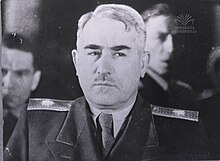Sergey Kavtaradze | |
|---|---|
სერგო ქავთარაძე Сергей Кавтарадзе | |
 | |
| Chairman of the Council of People's Commissars of the Georgian SSR | |
| In office April 1922 – January 1923 | |
| Premier | Vladimir Lenin |
| Preceded by | Polikarp Mdivani |
| Succeeded by | Shalva Eliava |
| Personal details | |
| Born | 15 August 1885 Zovreti, Kutais Governorate, Imperial Russia |
| Died | 17 October 1971 (aged 86) Tbilisi, Georgian SSR, Soviet Union |
| Citizenship | Soviet |
| Nationality | Georgian |
| Political party | Communist Party of the Soviet Union |
| Other political affiliations | Georgian Communist Party |
Sergey or Sergo Kavtaradze (Georgian: სერგო ქავთარაძე, Sergo Kavtaradze; Russian: Сергей Иванович Кавтарадзе, Sergey Ivanovich Kavtaradze; 15 August 1885 – 17 October 1971) was a Soviet politician and diplomat who briefly served as head of government in the Georgian SSR and as Deputy Prosecutor General of the Soviet Union. A Georgian Bolshevik activist, he was persecuted for his Trotskyist activities, but was pardoned and reinstated by his personal friend Joseph Stalin.
Arrested during the Great Purge, Kavtaradze became famous for being among the few victims to be brought out of jail and readmitted in the Soviet Communist Party hierarchy. He was Deputy to the Foreign Commissar Vyacheslav Molotov for the greater part of World War II, and, in 1944, was sent to Iran, where his controversial stance helped topple the Mohammad Sa'ed cabinet. Kavtaradze was also involved in provoking rebellion in the Iranian Azerbaijan and other Iranian-ruled areas.
His last major office was that of Ambassador to Romania, where he maintained close contacts with the Romanian Communist Party faction formed around Ana Pauker and played a part in facilitating electoral fraud during the general election of 1946.